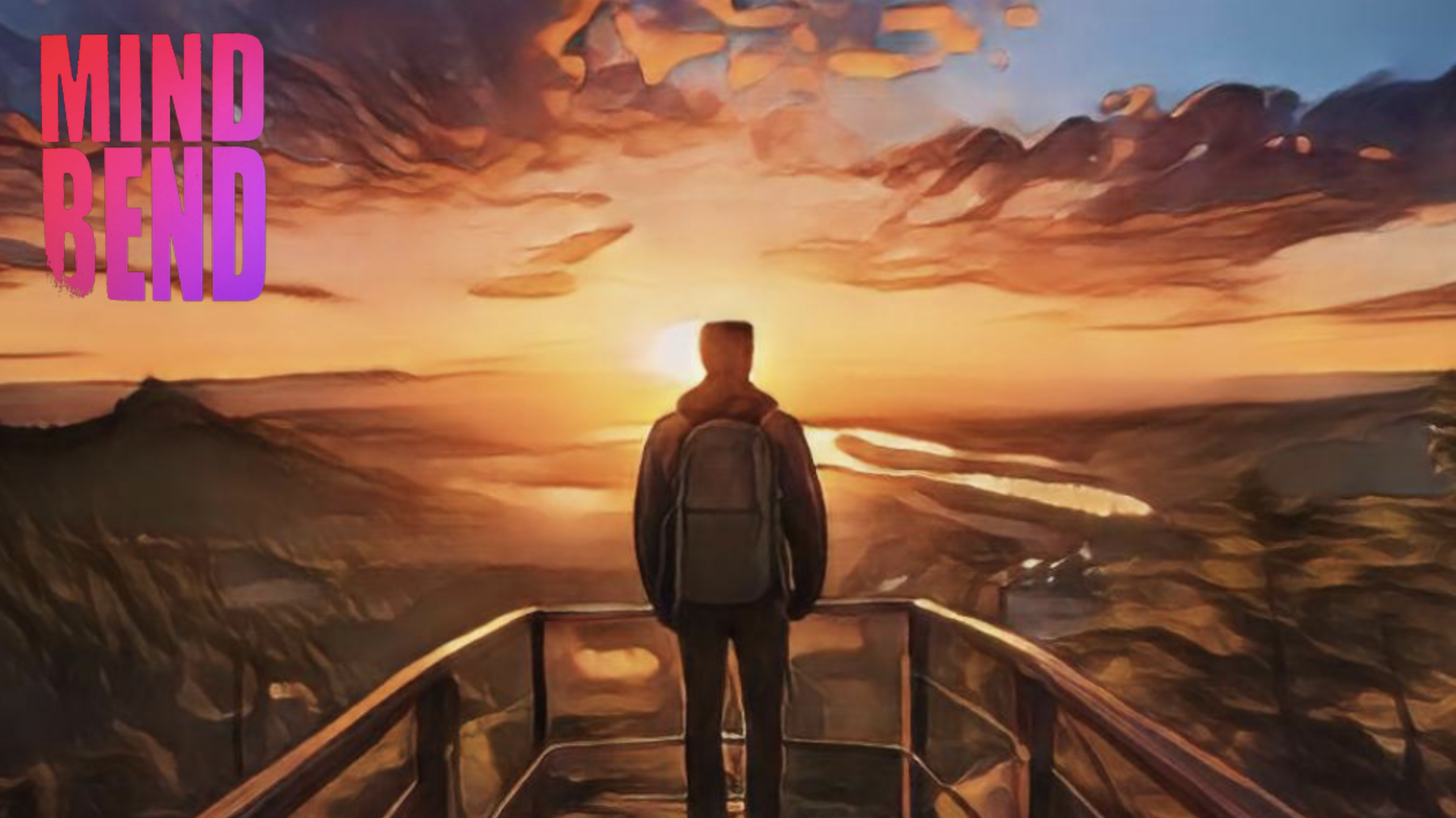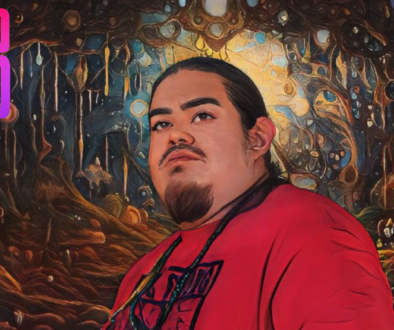Mendeleyev’s Musical Vision: Psychedelic Songwriting Informed by an Extraordinary Upbringing
For Mendeleyev, “Lev” for short, psychedelics weren’t discovered as an escape from turmoil or a last-ditch effort for spiritual clarity. Instead, they were woven into the fabric of his upbringing, forming a family-based rite of passage that framed these experiences as sacred, formative, and, above all, deeply personal. Growing up taking psychedelics with his family, Lev’s relationship with these substances is one steeped in a unique blend of reverence and creative curiosity.
Mendeleyev is refreshingly candid about his unusual childhood, a time marked by family gatherings that featured psychedelic experiences as intentional rites of passage rather than clandestine teenage escapades. This upbringing shaped his approach to music, art, and self-expression in ways that go far beyond surface-level experimentation. In the MINDBEND EP.41 episode, Lev shares how these experiences with his family didn’t just introduce him to non-ordinary states of consciousness—they introduced him to himself. From his early years, Mendeleyev was encouraged to look inward, a perspective that ultimately led him to view both life and art through a distinctly introspective lens.
Family Trips: The Origins of a Sacred Practice
When most people picture psychedelic journeys, they might envision solitary trips in nature or a wild night at a music festival. But for Mendeleyev, psychedelics were a family affair, a practice upheld by parents who valued intentionality and education over secrecy. He reflects on these experiences, recounting moments of intense bonding and self-discovery that he shared with his siblings and parents. Far from being a typical childhood, his youth was punctuated by significant moments that forced him to confront emotions, foster open communication, and develop a strong sense of self-awareness.
Mendeleyev recalls a Thanksgiving ritual in particular: instead of eating turkey, his family would partake in “mushroom feasts,” gathering together and setting intentions for a meaningful journey. He shares a striking memory from one such experience when, at 15, he found himself standing on a rooftop, staring at the sunset while balancing on a narrow railing. The sense of balance and clarity he felt in that moment was life-altering, imbuing him with a profound sense of confidence and inner harmony. However, the moment also brought tension, as his father’s palpable fear for his son’s safety created a rift in what was otherwise a transformative experience. This balance of self-assurance and responsibility toward his family would go on to become a recurring theme in Mendeleyev’s life and art.
“It was a rite of passage,” Mendeleyev reflects, recognizing the privilege of having a family that embraced psychedelics as a tool for self-growth rather than a forbidden taboo. While he acknowledges the risks, he credits these early experiences with helping him navigate life’s complexities, offering a solid foundation for understanding himself and the world around him.
Mendeleev’s journey with psychedelics was also shaped by a special connection to Ram Dass, the renowned spiritual teacher and author of Be Here Now. For Mendeleev, Ram Dass wasn’t just an influential figure in the psychedelic community—he was a family friend and a kind of grandfatherly presence. Mendeleev recalls visiting Ram Dass’s home and being encouraged to sing his own songs during gatherings. This open-hearted support left a lasting impact on him, reinforcing the importance of self-expression and acceptance. Ram Dass’s gentle, humorous spirit offered a model for embracing life’s complexities, even through profound challenges, and Mendeleev’s work today carries forward this legacy of openness, exploration, and love.

The Art and Ardor of Psychedelic Music
As he matured, Mendeleyev began to explore how these altered states could influence his music. In his latest project, Family Trips, he combines his reverence for psychedelics with his passion for music, creating an album that captures the raw, unfiltered essence of psychedelic experiences. The album is a deeply personal venture, one that involved recording throat-singing vocalizations while on various substances, including LSD, 2C-B and MDA. Each track serves as a unique auditory snapshot of a particular psychedelic journey, offering listeners a fly-on-the-wall experience into Mendeleyev’s world.
But Family Trips isn’t just a collection of trippy soundscapes meant for casual listening. Mendeleyev crafted it as a “fly on the wall” experience for listeners who may never have encountered psychedelics themselves. Each song reflects the character of the substance it was born from, and rather than adding elaborate post-production effects, he left the recordings almost entirely untouched, preserving the authenticity of each moment. For Mendeleyev, these sessions were not about producing commercially viable music but about channeling raw emotion and primal energy into sound.
The recording process was, in his words, a discipline of endurance and discovery. Mendeleyev would isolate himself with his instruments, focusing on a single activity—say, drumming for hours on end—until he was completely immersed. “It’s a trip,” he says with a chuckle, describing how he would lose himself in the intensity of the experience, pushing through moments of discomfort or fatigue to find an authentic release of emotion. Through these recordings, he invites listeners to witness not just his musical talent but his very soul, exposed and vulnerable.
The Expanding Cultural Landscape of Psychedelics
Mendeleyev’s experiences don’t just highlight the personal power of psychedelics; they also underscore the broader cultural shifts happening around these substances. Growing up in the ’90s, he witnessed the secrecy and stigma surrounding psychedelics—a time when openly discussing them could jeopardize careers, families, and personal freedoms. Today, he sees society moving toward a more open-minded approach, with an increasing focus on the therapeutic potential of psychedelics. Yet, he remains cautious, recognizing that the mainstream acceptance of psychedelics brings both opportunities and challenges.
The conversation turns to the medicalization of psychedelics, particularly the growing interest in therapies for PTSD and other mental health conditions. Mendeleyev expresses a hopeful but measured view, appreciating the progress made by organizations like MAPS (Multidisciplinary Association for Psychedelic Studies) while also acknowledging the complexities that come with widespread legalization. “We need more education and research,” he says, emphasizing that mainstream acceptance shouldn’t erase the importance of honoring indigenous knowledge and sacred practices.
At the same time, Mendeleyev is wary of the commercialization of psychedelics, particularly as pharmaceutical companies eye the potential profits. He sees a risk in reducing psychedelics to mere medical treatments, losing sight of their profound spiritual and cultural significance. For him, the power of these substances lies in their ability to foster connection—to oneself, to others, and to the natural world.

A Life in Balance: Honoring the Spirit of Psychedelics
Though he speaks passionately about the benefits of psychedelics, Mendeleyev is equally candid about the importance of moderation and respect. His journey has not been without challenges, and he openly discusses his past struggles with substances like cannabis and tobacco. These were not simply recreational habits; at times, they became crutches, interfering with his creative process and mental well-being. He describes the seductive nature of habitual use, especially when creative energy and substance use become intertwined in daily life.
However, Mendeleyev’s respect for psychedelics has kept him grounded. Unlike addictive substances, he explains that psychedelics don’t create dependency but instead encourage self-reflection and growth. For him, each psychedelic experience is a reminder of his capacity for resilience and introspection, lessons that extend beyond his music and into his everyday life. This balance between indulgence and discipline is what he calls “a lifelong journey,” one that has taught him to approach every aspect of life with a sense of humility and respect.
Reflecting on his upbringing, Mendeleyev considers himself fortunate to have been introduced to psychedelics in a way that emphasized safety, education, and family connection. He speaks fondly of his father, who guided him through his first experiences, setting the stage for a life enriched by self-awareness and creativity. And while his journey is uniquely his own, Mendeleyev sees his story as part of a broader tapestry—a movement of people who are redefining what it means to live consciously, to create art, and to connect with one another.
The Future of Psychedelic Art and Culture
As Mendeleyev looks to the future, he envisions a world where psychedelics are embraced as tools for healing and self-exploration, not just commodified by industries eager to capitalize on their popularity. His music is both a personal expression and a cultural statement, an invitation for others to explore their own potential for transformation. With Family Trips set to release soon, he hopes to offer listeners a glimpse into the raw, often challenging, but ultimately rewarding experience of psychedelic exploration.
As he continues to perform, create, and experiment, he remains committed to honoring the spirit of psychedelics—a spirit that, for him, is less about the substances themselves and more about the connections they facilitate. Whether through a powerful family trip or a solo music session, Mendeleyev’s story is a reminder of the beauty and depth that psychedelics can bring into our lives when approached with intention, respect, and love.




